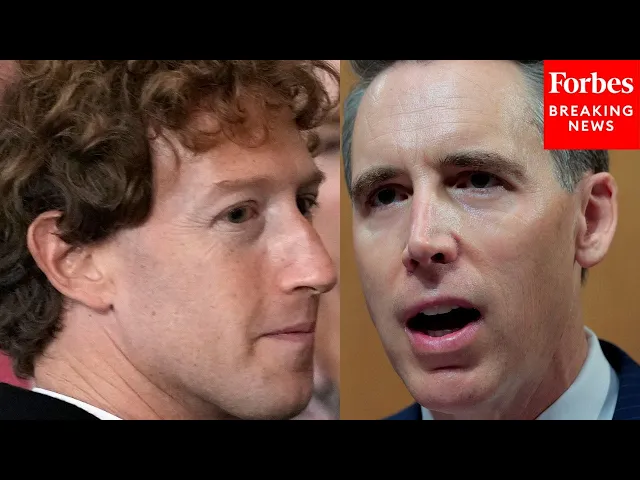‘Mark Zuckerberg Himself Approved The Decision’: Hawley Accuses Meta Of Training AI On ‘Stolen’ Work

Meta's AI ethics debate heats up
In a recent Senate hearing that has sent ripples through the tech industry, Senator Josh Hawley confronted Meta's Global Affairs President Nick Clegg with pointed accusations about the company's AI development practices. The exchange, characterized by Hawley's trademark prosecutorial style, zeroed in on allegations that Meta has been training its AI models on copyrighted content without proper authorization—what he bluntly referred to as "stolen" work.
The confrontation highlights a growing tension at the intersection of artificial intelligence, intellectual property, and corporate responsibility that's becoming increasingly difficult for the tech sector to navigate. As AI systems become more sophisticated and integrated into our digital landscape, questions about the data they're built upon are moving from academic debates to congressional hearing rooms.
Key takeaways from the hearing:
-
Senator Hawley directly accused Meta of training its AI models on copyrighted materials without permission, claiming Mark Zuckerberg personally approved this approach despite legal concerns.
-
Meta's Nick Clegg defended the company's practices by framing them within the context of "fair use" doctrine, arguing that using publicly available information for AI training represents a transformative use that benefits society.
-
The exchange underscored fundamental disagreements about whether scraping publicly available content for AI training purposes constitutes copyright infringement or falls under fair use protections.
-
The hearing revealed that Meta has apparently been in contact with the Department of Justice regarding antitrust concerns related to their partnership with Microsoft.
-
Clegg acknowledged that Meta does not currently have licensing agreements with major news publishers for content used in AI training, despite concerns raised internally by Meta's own legal team.
Navigating the uncharted legal territory
Perhaps the most telling moment in the hearing came when Clegg attempted to frame Meta's content scraping practices within established legal precedent. "Training AI models on publicly available information is fair use," he stated, invoking a doctrine that has traditionally allowed limited use of copyrighted material for purposes like commentary, criticism, or research.
This position reveals the fundamental challenge facing the industry: existing copyright law was not designed with generative AI in mind. The scale at which these systems operate—processing millions of copyrighted works to learn patterns and generate new content—has no clear precedent in copyright jurisprudence. While companies like Meta an
Recent Videos
How To Earn MONEY With Images (No Bullsh*t)
Smart earnings from your image collection In today's digital economy, passive income streams have become increasingly accessible to creators with various skill sets. A recent YouTube video cuts through the hype to explore legitimate ways photographers, designers, and even casual smartphone users can monetize their image collections. The strategies outlined don't rely on unrealistic promises or complicated schemes—instead, they focus on established marketplaces with proven revenue potential for image creators. Key Points Stock photography platforms like Shutterstock, Adobe Stock, and Getty Images remain viable income sources when you understand their specific requirements and optimize your submissions accordingly. Specialized marketplaces focusing...
Oct 3, 2025New SHAPE SHIFTING AI Robot Is Freaking People Out
Liquid robots will change everything In the quiet labs of Carnegie Mellon University, scientists have created something that feels plucked from science fiction—a magnetic slime robot that can transform between liquid and solid states, slipping through tight spaces before reassembling on the other side. This technology, showcased in a recent YouTube video, represents a significant leap beyond traditional robotics into a realm where machines mimic not just animal movements, but their fundamental physical properties. While the internet might be buzzing with dystopian concerns about "shape-shifting terminators," the reality offers far more promising applications that could revolutionize medicine, rescue operations, and...
Oct 3, 2025How To Do Homeless AI Tiktok Trend (Tiktok Homeless AI Tutorial)
AI homeless trend raises ethical concerns In an era where social media trends evolve faster than we can comprehend them, TikTok's "homeless AI" trend has sparked both creative engagement and serious ethical questions. The trend, which involves using AI to transform ordinary photos into images depicting homelessness, has rapidly gained traction across the platform, with creators eagerly jumping on board to showcase their digital transformations. While the technical process is relatively straightforward, the implications of digitally "becoming homeless" for entertainment deserve careful consideration. The video tutorial provides a step-by-step guide on creating these AI-generated images, explaining how users can transform...
